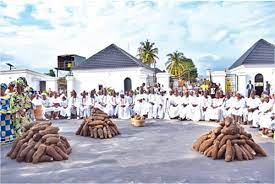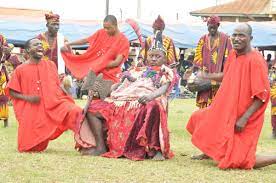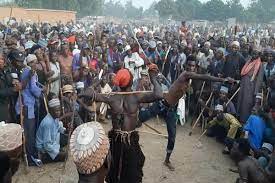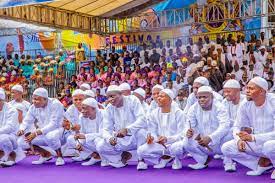
The Yam Festival of the Igbo people is an amazing cultural event that has been celebrated for centuries. It is a time of joy and celebration at the end of the rainy season in early August.
This festival is widely practiced throughout West Africa and other African countries, and even beyond. It is a time to celebrate the harvest of yams and to pay homage to the gods of fertility.
Join us as we explore the history, traditions, and significance of the New Yam Festival of the Igbo people.
Background on the Igbo people and their culture
The Igbo people are one of the largest ethnic groups in Nigeria, with a population of over 40 million. They are known for their rich cultural heritage, which includes traditional beliefs, customs, and practices. The Igbo culture is based on the principles of respect for elders, communal living, and a deep connection to the land.
They are also known for their artistic expression, which is evident in their music, dance, and clothing. The Igbo people have a deep sense of pride in their cultural heritage, and they are known to celebrate it with great fervor and enthusiasm. The New Yam Festival, or Iri ji, is just one of the many ways in which the Igbo people celebrate their cultural heritage.
What is the Yam Festival?
The Yam Festival, also known as the Iri ji festival, is an annual cultural festival celebrated by the Igbo people of Nigeria. This festival takes place at the end of the rainy season in early August, and it marks the beginning of the harvest season.
The New Yam Festival is an important event in the Igbo culture and holds a special significance for the community. It is a time to offer thanks to the gods for a bountiful harvest and to seek their blessings for the coming year.
During the festival, people dress up in traditional clothing and gather in public places to celebrate with dancing, singing, and feasting. Yam, the most important crop in Igbo culture, is the centerpiece of the festival and is typically presented to the community leader as a symbol of the harvest.
In addition to celebrating the harvest, the New Yam Festival is also a time for reconciliation and forgiveness. The festival provides an opportunity for community members to come together and resolve conflicts, paving the way for a peaceful and prosperous year ahead.
Overall, the New Yam Festival is a joyous celebration of culture and community, showcasing the Igbo people's deep connection to the land and their gratitude for a bountiful harvest.
Origins and significance of the festival
The New Yam Festival, also known as Iri ji, has a long and rich history within the Igbo culture. It is believed to have originated from the myth of the earth goddess, Ani, who blessed the Igbo people with yam as their staple crop. Therefore, the festival is not only a celebration of a successful harvest, but also a way to honor and thank Ani for her blessings.
The festival holds great significance for the Igbo people, as it marks the beginning of a new year and a time of renewal. It is a time for community members to come together and share in the abundance of the harvest, and to give thanks for all the blessings of the previous year. The festival is also a way to showcase the cultural heritage of the Igbo people, as they dress in traditional attire, dance to traditional music, and perform cultural rituals.
The New Yam Festival is a time for unity, harmony, and gratitude, and serves as an important reminder of the importance of community and cultural heritage. Despite the changes brought about by modernization and globalization, the festival remains a cherished tradition among the Igbo people and is celebrated with great enthusiasm and pride every year.
Preparation and rituals for the festival
The preparation for the New Yam Festival starts well in advance. As the festival marks the beginning of the harvesting season, it is crucial for the Igbo people to ensure a bountiful and successful harvest. Farmers begin preparing their yam fields by clearing them of weeds and other unwanted plants. This process is often a community effort, with neighbors coming together to help one another.
In the weeks leading up to the festival, the yam tubers are carefully dug up and stored in a special barn. This is done to protect them from pests and to allow them to dry and harden. During this time, various rituals are performed to invoke the blessings of the deities and ancestors for a prosperous harvest.
One of the key rituals is the yam cutting ceremony, which is performed by the eldest man in the community or by the village chief. This ceremony is done with great precision and involves using a special knife to cut the first yam tuber. The harvested yam is then offered to the gods and ancestors as a sign of gratitude and reverence.
Another important ritual is the mmanwu masquerade dance. This dance is performed by masked individuals, representing ancestral spirits. The masquerades dance through the village streets, bringing blessings and warding off evil spirits.
Overall, the preparation and rituals for the New Yam Festival hold deep spiritual significance for the Igbo people. It is a time of gratitude, reflection, and hope for a prosperous future.
Activities during the festival
The New Yam Festival is a joyous celebration that involves a range of activities that reflect the Igbo people's customs and traditions. One of the most notable events during the festival is the yam harvesting ceremony, which takes place early in the morning. Men and women gather in their farms to harvest the new yam crop, accompanied by drumming and dancing.
After the yam harvest, the people return to their communities to participate in other activities, such as parades, masquerades, and cultural performances. The colorful and elaborate masquerades, known as Mmanwu, are a central feature of the festival. The performers wear elaborate masks and costumes and perform intricate dance routines, telling stories of their ancestors.
Another highlight of the festival is the wrestling competition, which is held to honor the bravery of the Igbo warriors. The wrestling competition attracts many young men from different communities, and the winner is awarded a significant prize.
In addition to these traditional activities, modern events have been incorporated into the New Yam Festival in recent years. These include fashion shows, music concerts, and other forms of entertainment that showcase the vibrant culture of the Igbo people. The festival has become an opportunity for the younger generation to learn about and celebrate their heritage while also enjoying contemporary forms of entertainment.
Food and cuisine during the festival
One of the most exciting aspects of the New Yam Festival is the abundance of food and cuisine that is prepared and enjoyed during this time. As the festival is centered around the harvesting and consumption of yams, it is no surprise that yam-based dishes are the highlight of the festival's culinary offerings.
During the festival, traditional Igbo dishes such as pounded yam, yam porridge, and yam fufu are commonly prepared and served. These dishes showcase the versatility of yams and are enjoyed by both young and old alike. In addition to yam dishes, various other delicacies are also prepared to accompany the yam-based meals.
Meat, poultry, and fish are also key components of the festival's food offerings. Locally sourced and fresh ingredients are used to prepare flavorful stews, soups, and sauces to enhance the taste of the dishes. Spices and herbs are added to create rich and aromatic flavors that leave a lasting impression on the taste buds.
Furthermore, the New Yam Festival provides an opportunity for communal eating and sharing. Families and communities come together to enjoy meals, and guests are often welcomed with open arms to partake in the festivities. The act of sharing meals during this festival promotes unity and togetherness among the Igbo people.
Overall, the food and cuisine during the New Yam Festival not only celebrate the harvest and the significance of yams but also showcase the culinary traditions and communal values of the Igbo people. It is a time of joy, feasting, and appreciating the flavors of traditional Igbo cuisine.
Contemporary interpretations and changes to the festival
While the New Yam Festival remains an important cultural celebration for the Igbo people, contemporary interpretations and changes have been made to adapt to modern times. In recent years, there has been a growing movement towards incorporating more environmentally-friendly practices into the festival, such as using natural dyes for the cloth used during the festival and promoting sustainable farming practices.
Another notable change is the inclusion of non-Igbo people and visitors to participate in the festival, which was traditionally only for Igbo community members. This has led to the festival becoming more of a tourist attraction, with visitors coming from all over the world to witness the unique cultural practices and celebrations.
However, some have also criticized the commercialization of the festival, with some vendors using the festival as an opportunity to make profits. Additionally, the influence of Christianity and Islam in the region has led to a decline in traditional practices, with some Igbo people choosing to celebrate in a more secular manner.
Despite these changes, the New Yam Festival remains an important part of Igbo culture and identity, and continues to be celebrated with great joy and reverence by the Igbo people and other West African communities.
Similar festivals across West Africa and beyond
The New Yam Festival of the Igbo people, also known as the Iri ji festival, is not only celebrated by the Igbo people, but also by other ethnic groups across West Africa and even in some African diaspora communities around the world. In countries like Nigeria, Ghana, Togo, Benin, and Cameroon, variations of the festival are observed with their own unique traditions and names.
In Nigeria, for example, the Edo people celebrate the Igue festival, which is similar to the New Yam Festival in its purpose of giving thanks to the gods for a bountiful harvest. The Ewe people of Ghana and Togo also have their own version called the Homowo festival, which is celebrated in remembrance of a time of famine and the subsequent abundance of yams.
Beyond West Africa, similar festivals can be found in countries like Papua New Guinea, where the Yam Festival is a major cultural event celebrated by various tribes. These festivals serve as a testament to the importance of yam in the diets and cultural practices of many different communities across the world.
Although the specific customs and traditions may vary from region to region, the underlying theme of giving thanks for a successful harvest and praying for future abundance remains consistent.
These festivals not only celebrate the agricultural significance of yam, but also promote community cohesion and cultural identity. Through these shared festivals, people from different regions and backgrounds can come together to appreciate and honor their shared heritage and traditions.






















